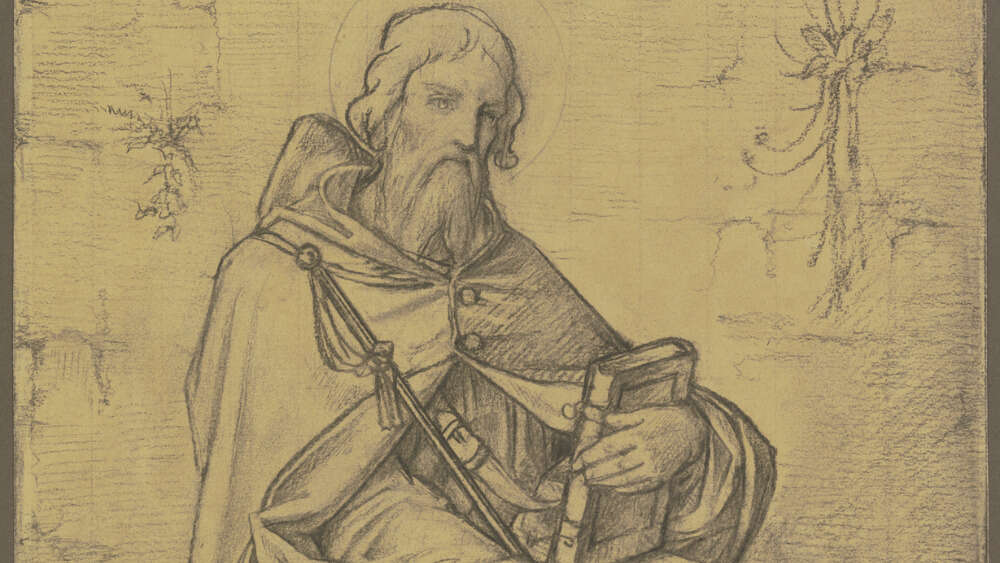Thomas Aquinas (1224-1274) is considered one of the most authoritative thinkers in the history of Western philosophy and theology. His intellect and insight were worthy of comparison to the likes of Homer, Aristotle, Dante and Shakespeare – among others.
Thomas was a teacher, a preacher and a theologian. To those roles, we can add philosopher, saint and a Doctor of the Church.
Thomas was the youngest of nine children of an influential Count, born at the family castle of Roccasecca, east of Naples, Italy. He was a child prodigy, both in intelligence and sanctity. At the age of five, he was sent to the Benedictine abbey at Monte Cassino (southeast of Rome) for elementary schooling. There he learned the rudiments of the contemplative life and the Scriptures. In his early years at Monte Cassino, his most burning, repeated question to all was, “What is God?”
Thomas was without an ego to skite or self-promote, which prompted his fellow students to the nickname “the dumb ox”.
After spending nine years with the Benedictines, he took up studies in philosophy at the University of Naples, where he was introduced to the works of Aristotle (384-322 BC), notably first principles and causes (metaphysics), the existence of God, the nature of the soul – and the law. He studied under St Albert the Great, the most famous teacher in Christendom at that time, an Aristotelian who synthesised Greek philosophy with Christianity. Thomas readily appreciated Aristotle’s method of logical analysis and his natural philosophy to providing rational explanations to theological questions. The young Thomas became one of Aristotelianism’s most enthusiastic and important adepts.
While studying in Naples, Thomas, aged 19, entered the Dominican order, a decision that aroused considerable opposition from his family. Wanting him to become a Benedictine abbot, his family abducted him and brought him back to Roccasecca where he was to remain under house arrest for at least 12 months. Finally, his parents relented and on regaining his freedom, Thomas journeyed north to pursue his studies in Paris and Cologne.

Sketch of Thomas Aquinas by Leopold Bode: ‘Der Heilige Thomas von Aquin in ganzer Figur an alten Gemäuern sitzend’ Städel Museum/ Wikimedia Commons
In his undergraduate classes, Thomas said little. One who never made a fuss, Thomas was without an ego to skite or self-promote, which prompted his fellow students to the nickname “the dumb ox”. But Albert, the insightful mentor of Thomas, would respond, “You call him the dumb ox, but I assure you he will one day produce such a bellowing that it will be heard throughout the world.” In his mid-20s Thomas had written commentaries on the Bible and (especially for his fellow Dominicans) Peter Lombard’s Sentences. By his early 30s, he had expanded his writing to philosophical subjects including being and essence (De ente et essentia) and by his early 30s, on nature (De Natura). He had four scribes to whom he would dictate to on four different (and often complex) topics, all at once.
The intellectual rigour and insight of Thomas was on full display as he continued to write on themes as varied as God and creation, good and evil, happiness and virtue theory, the will and the intellect, soul and body, and ethics. He also wrote extensively on biblical Law. In his Treatise of Law of the Summa theologiae, Thomas explores the concept of law, including the eternal law, natural law, divine law and human law, and their relationship to morality and human behaviour. In his explanation of these laws, Thomas writes that the ground of all law is the eternal law, that reasonable ordo (order) by which God governs the whole of the universe in his providence, drawing all things to their ends individually and with an eye to the common good.[1]
For him, it was better to cast light for his readers than merely to shine for oneself.
Thomas lived his life humbly and gently, absorbed in envisaging the mind of God and in sharing with others the fruits of his contemplation. For him, it was better to cast light for his readers than merely to shine for oneself, as we are reminded in the Dominican motto, “contemplata aliis tradere” – contemplated to hand on to others.
St Thomas Aquinas shared the gift of a marvellously powerful intellect and exercised it to the fullest. That he was a theological genius, there is no doubt: he prayed with his pen. His writing was prolific: in all some 70 books, the most famous being the Summa theologiae (five volumes, and 3000 pages) — it is said, nearly nine million words.
The American philosopher Peter Kreeft of Boston College, Massachusetts, notes that Thomas was judicious, moderate and analytical, successfully combining careful, elaborate detail with the “big picture”. Thomas was both particularly devout and unfailingly modest. Late one night his fellow monks once found him prone on the floor of the chapel in audible conversation with Christ on the crucifix, who said to him, “You have written well of me Thomas. What will you have as your reward?” He answered simply, “Nothing but you, Lord.” Thomas would have said that those were the four most eloquent words of his life.[2]
Michael Hume is a recently retired solicitor of a general legal firm of which he was the principal. He holds a Master of Arts (Philosophy) from the University of Notre Dame, Sydney, where he has continued his association as a casual teacher in Advocacy (Faculty of Law) and a member of its Philosophy Reading Group. Michael regularly writes, facilitates and presents on theological and philosophical topics.
[1] Aquinas, Thomas Summa theologiae (ST) I-II, q.91, a. 1-6.
[2] Kreeft, Peter, Socrates Children: Medieval Philosophers, Volume II, pg 83.
Email This Story
Why not send this to a friend?


